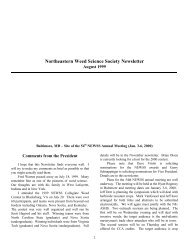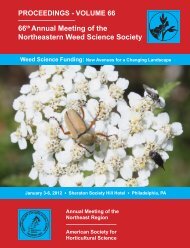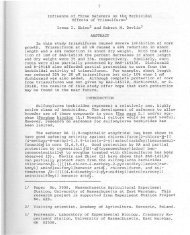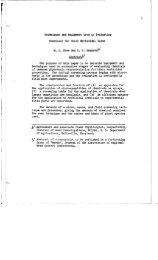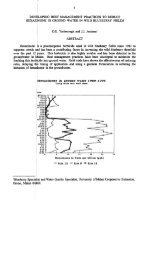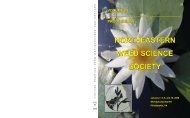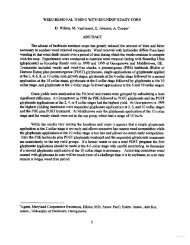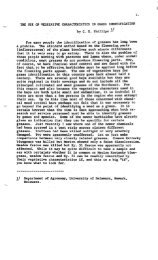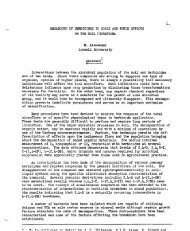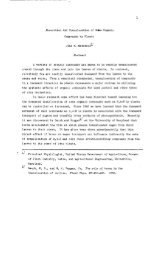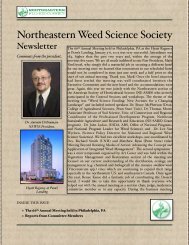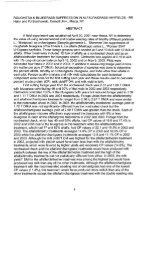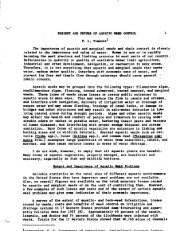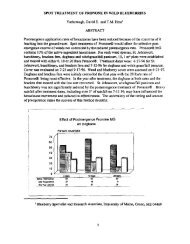Proceedings of the Sixty-first Annual Meeting of the Northeastern ...
Proceedings of the Sixty-first Annual Meeting of the Northeastern ...
Proceedings of the Sixty-first Annual Meeting of the Northeastern ...
Create successful ePaper yourself
Turn your PDF publications into a flip-book with our unique Google optimized e-Paper software.
184<br />
b. Selection <strong>of</strong> a WSSA Member for IAFWA’s Invasive Species Committee. Lee said<br />
this would be a great opportunity to get one or more weed science members involved<br />
and actively promoting <strong>the</strong> devastation <strong>of</strong> wildlife habitat loss caused by invasive<br />
weeds.<br />
The WSSA Provides Comments for <strong>the</strong> USDA-CSREES Stakeholder Workshop on Plant<br />
and Pest Biology Priorities and Concerns<br />
On November 16, 2005, <strong>the</strong> USDA Cooperative State Research, Education, and Extension<br />
Service (CSREES) hosted a one day workshop on stakeholder priorities in <strong>the</strong> area <strong>of</strong> plant and<br />
pest biology. Over 20 different stakeholder groups provided comments and concerns during <strong>the</strong><br />
workshop. Working in conjunction with <strong>the</strong> WSSA Research and Competitive Grants<br />
Committee, written comments were submitted along with an oral presentation by Dr. David<br />
Shaw, who did an excellent job in presenting WSSA’s concerns.<br />
The WSSA expressed its deep concern with <strong>the</strong> direction <strong>of</strong> <strong>the</strong> NRI Competitive Grants<br />
Program 51.9, The Biology <strong>of</strong> Weedy and Invasive Species in Agroecosystems. This is a<br />
significant source <strong>of</strong> competitively awarded funding for many weed scientists. This grant<br />
program now targets not only weedy and invasive plants, but all o<strong>the</strong>r invasive species without<br />
an increase in funding this year. There are o<strong>the</strong>r NRI grant programs that deal with <strong>the</strong> biology<br />
<strong>of</strong> arthropods, nematodes, and microorganisms which were not opened up to invasion biology<br />
for <strong>the</strong>ir representative organisms. The WSSA stated that it would like to see invasion biology<br />
for different species placed in <strong>the</strong>ir respective NRI Programs.<br />
Two o<strong>the</strong>r concerns <strong>the</strong> WSSA expressed for <strong>the</strong> current request for application (RFA) for <strong>the</strong><br />
NRI Program on The Biology <strong>of</strong> Weedy and Invasive Species in Agroecosystems were: 1) its<br />
focus on ecological studies on invasive species at <strong>the</strong> population level and above with no<br />
emphasis on weed biology at <strong>the</strong> suborganismal level; and 2) <strong>the</strong> fact that this is <strong>the</strong> only NRI<br />
Grant Program that now requires a letter <strong>of</strong> intent, thus reducing <strong>the</strong> flexibility <strong>of</strong> weed scientists<br />
to consider o<strong>the</strong>r NRI Grant Programs and limiting <strong>the</strong> grant preparation period to less than 1.5<br />
months.<br />
The WSSA also provided comments to USDA-CSREES about <strong>the</strong> need for increased funding<br />
for weed science research in <strong>the</strong> following areas:<br />
• Weed Biology and Ecology- Better understanding <strong>of</strong> weed biology and weed ecology is<br />
needed for development <strong>of</strong> more effective integrated weed management systems which<br />
utilize all tools available including cultural, mechanical, biological and chemical control<br />
strategies. Weed biology and weed ecology research is also needed to accelerate progress<br />
in several areas <strong>of</strong> weed management such as GPS/GIS based variable rate herbicide<br />
applications, herbicide resistant crops (HRC) and knowledge based decision support<br />
systems. The value <strong>of</strong> <strong>the</strong>se management tools depends greatly on better understanding <strong>of</strong><br />
<strong>the</strong> mechanisms <strong>of</strong> weed, crop and cropping system interactions. This includes research in<br />
weed genetics and physiology.<br />
• Invasive Weeds- Predictive tools are needed to identify species <strong>of</strong> concern and potential for<br />
invasion into sensitive ecosystems. Systems for early detection and rapid response (EDRR)<br />
are also needed to combat potentially serious weed invasions caused by human activity,<br />
whe<strong>the</strong>r accidental or intentional. Development <strong>of</strong> tools to assess impacts <strong>of</strong> weeds on<br />
ecosystems, including threatened and endangered species, requires basic research on <strong>the</strong><br />
mechanisms <strong>of</strong> plant invasion. Economic assessment tools are also needed to quantify <strong>the</strong><br />
impacts <strong>of</strong> <strong>the</strong> problem and to help set management priorities.<br />
166



